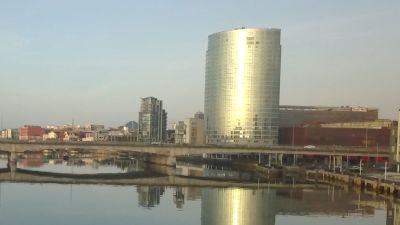Construction firm fails in bid to halt High Court action over Obel Tower fire protection defects

A construction firm has failed in a legal bid to halt a High Court action over alleged “life-threatening” fire protection defects at Northern Ireland’s tallest residential building.
O’Hare & McGovern (OHMG) sought a declaration that the management company of the Obel Tower in Belfast cannot pursue a case aimed at compelling it to carry out any necessary remedial works.
Lawyers for the company argued that a contractual right to bring proceedings was invalidly transferred by the original developer now in liquidation.
But Mr Justice Humphreys ruled: “There is no basis to say that business common sense would prefer the limitation which OHMG seeks to impose.”
Completed in 2011, the Obel Tower includes 233 apartments and office accommodation.
It was later repossessed and eventually sold due to the bank debts of the developer, Donegall Quay Ltd.
Under government checks introduced after the 2017 Grenfell Tower tragedy in London when 72 people died in a blaze, external wall safety (EWS1) surveys are now required at high-rise buildings to ensure cladding has been properly assessed for fire risk.
Significant defects allegedly identified at the Obel complex last year prevented an EWS1 certificate from being issued.
Proceedings have been issued against OHMG by original developer Donegall Quay Ltd (in liquidation), Obel Management Ltd and Obel Ground Ltd.
Urgent work at a cost of nearly £1million is required to fix cladding and fire protection at the building, it has been claimed.
In court on Friday, counsel for the tower block’s current owners and management company reiterated the seriousness of the alleged flaws.
Sean Brannigan KC, instructed by O’Reilly Stewart law firm, contended: “There does not seem, on the face of it, to be any defence whatsoever being offered to the simple proposition that there are life-threatening defects in this development.”
The proceedings issued against OHMG earlier this year seek specific performance of obligations under the contract.
Part of the defence to the legal action relates to the potential responsibility of any subcontractors involved in the development.
The building company also wanted a ruling that there is no standing to pursue a claim, with any contract rendered unenforceable when Donegall Quay Ltd (DQL) went into liquidation.
However, the judge held: “It makes entire commercial sense for DQL to be able to assign any right of action against OHMG under the contract to a party which is going to assume such obligations and potential liabilities.”
He confirmed: “The assignment was valid and effective and there is no basis to contend otherwise.”
The action is now expected to progress to a full hearing later this year.
Want a quick and expert briefing on the biggest news stories? Listen to our latest podcasts to find out What You Need To Know.